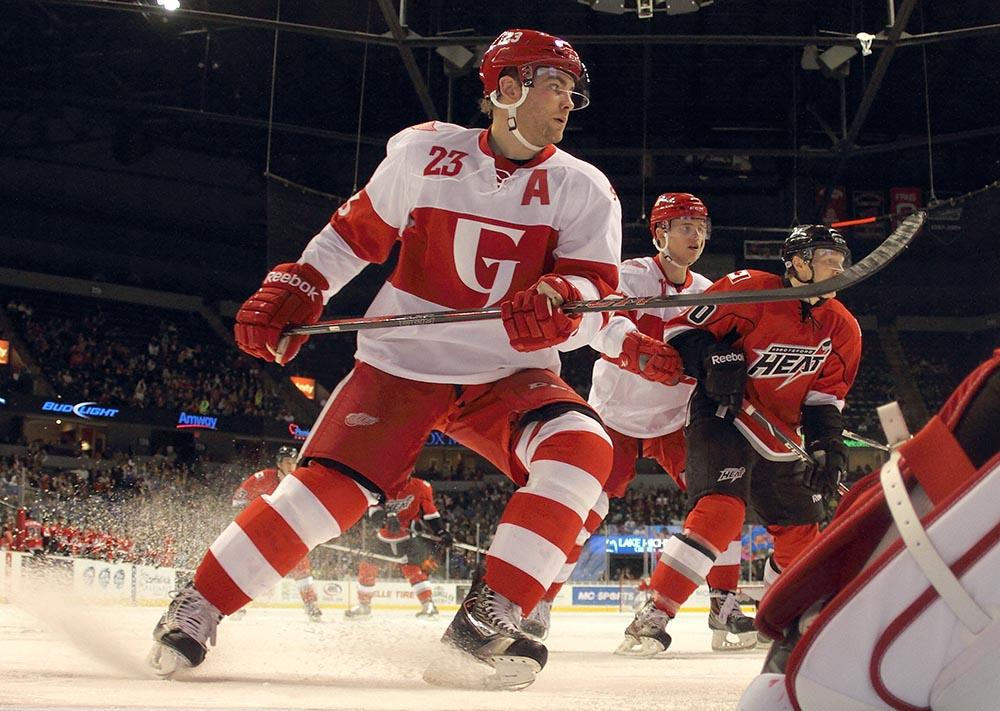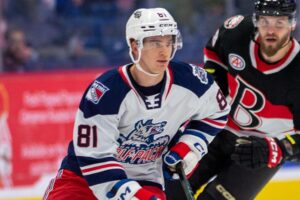by Alan Cross || AHL On The Beat Archive
Heading into the season, Griffins head coach Jeff Blashill was insistent on regrouping as many ingredients to his 2013 Calder Cup-winning recipe that he could.
“We thought it was extremely important to get our vets back,” Blashill said last September. “We felt like they created a culture in our locker room of work ethic and day-to-day competitions, and that’s extremely important to winning.
“We felt that they helped the development of our young players as well, which both helps us in Grand Rapids and ultimately helps in Detroit. So to me, that was a critical thing, and we’re real excited to have those guys back.”
One of those crucial ingredients is left wing Triston Grant. An equally influential presence both on and off the ice, the Neepawa, Man., native has taken on a leadership role during his two-year tenure in Grand Rapids.
“Some people are just natural leaders; you always hear that term. Some people’s personalities take care of that and make the locker room a workable habitat,” Grant said. “For me, I like to enjoy myself. You have to at least make sure you’re having fun at the rink.
“They always say that if you’re having fun and you enjoy what you’re doing, it’s never a day of work. I always want to make sure it’s like that, and I want to make sure it rubs off on the others.”
Known by a handful of nicknames by his teammates but most affectionately referred to as “Bubba,” Grant was initially signed to a one-year contract by the Griffins on July 9, 2012. Upon helping the team to its innumerable successes during the 2012-13 season, Grant was re-signed to another one-year contract on July 8, 2013.
Now in his ninth professional season, Grant serves as one of several Griffins gurus alongside the likes of Brennan Evans, Nathan Paetsch and captain Jeff Hoggan. On the ice, Grant is one of the main defenders of his teammates due to his size and physicality. In his first season with Grand Rapids alone, the 6-foot-1, 218-pound winger picked up a team-high 196 penalty minutes.
“Blashill doesn’t have to tell us that we’re the veterans – we’ve all been in this league long enough to know. That’s part of the reason why we’re still in this league, because we know how to contribute not only on the ice but in the locker room,” Grant said. “After last year, I think it really elevated the older guys and raised the bar on how it’s got to be in order to be successful around here.”
Beyond the parameters of the ice, chemistry plays a huge hand in determining a team’s success. It’s a challenge right off the bat, considering the array of personalities and backgrounds in any given locker room. Throw in language and cultural differences, along with the ever-changing landscape that is an AHL roster, and you have a treacherous climb toward team harmony.
It’s the charge of the veteran players, primarily, to fashion the team’s differences into a one amicable winning machine. However, one of the more common wrenches is a jilted player experiencing the extreme ups and downs that come along with professional hockey.
“I remember being younger, we had some older guys on our team that would say things like ‘Oh, you know, I shouldn’t be here,’ and stuff like that. And when you see it from a different angle, see that someone else is not acting the right way as a teammate, it’s easy to pick up on. It helps you to not act like that and learn how poor that is for a team.
“That sort of stuff is contagious. One rotten apple spoils the whole bunch. You just try to pick those guys up because it’s understandable.”
Grant polishes those bruised apples with the aid of “Triston’s Toy Box,” a cardboard chest in the locker room filled with Nerf guns, mini-sticks, toy guitars and hacky sacks, among other comical knick-knacks. The occasional prank is always in the works, too.
“When everyone is happy, you have more confidence, you play better and the team does better. At the end of the day, it’s about winning. A team is not going to win if you have guys who aren’t happy.”
But Grant himself experienced an unexpected turn of events earlier in the season when the Detroit Red Wings’ assignments of Cory Emmerton, Jordin Tootoo and Patrick Eaves forced Blashill to begin sitting out veteran players because of the AHL’s player development rule, which essentially states that each team is restricted to dressing only five vets per game. As a result, the Griffins have had to sit out either one or two veterans for most games, on a rotating basis.
At times, it’s been Grant’s turn to sit out. Seven times, to be exact.
“I don’t like sitting out, no one does,” Grant confessed. “We all want to compete and play. No one likes sitting in the stands and watching.”
In addition to his seven healthy scratches, Grant missed six games due to an upper-body injury from Feb. 1-15 and was suspended for another. Last season, he missed only one game, a suspension.
Grant, who returned to the Griffins in part to lead the younger generation, must now uphold his good attitude and winning locker-room culture while intermittently being forced to sit out.
It’s a conundrum, to be certain.
“For me, at times, it’s been a bit of a challenge, but you just embrace it and try to make the most of it,” Grant said. “I think I’m fortunate that I’m a pretty good teammate and can support the guys whether I’m playing or not. I would be lying if I said that I don’t care about being scratched. Obviously I do care, and it’s unfortunate with the way the situation is, but that’s how it is. You can always contribute in other ways.”
With years of experience and wisdom to offset any frustrations, Grant maintains his signature infectious sense of humor to remind the team, and himself, that things aren’t so bad.
And the Griffins’ 39-18-2-4 record doesn’t hurt, either.
“I’ve been on teams where we’ve been just the worst team in the league, and it’s just not good. It’s not fun. Hockey is supposed to be fun,” Grant said. “We’re all fortunate that we get to do this for a living and come to the rink every day, so it doesn’t make any sense to come in and moan about things. That’s not good for any working habitat, whether it’s a dressing room or an office of cubicles.”






































